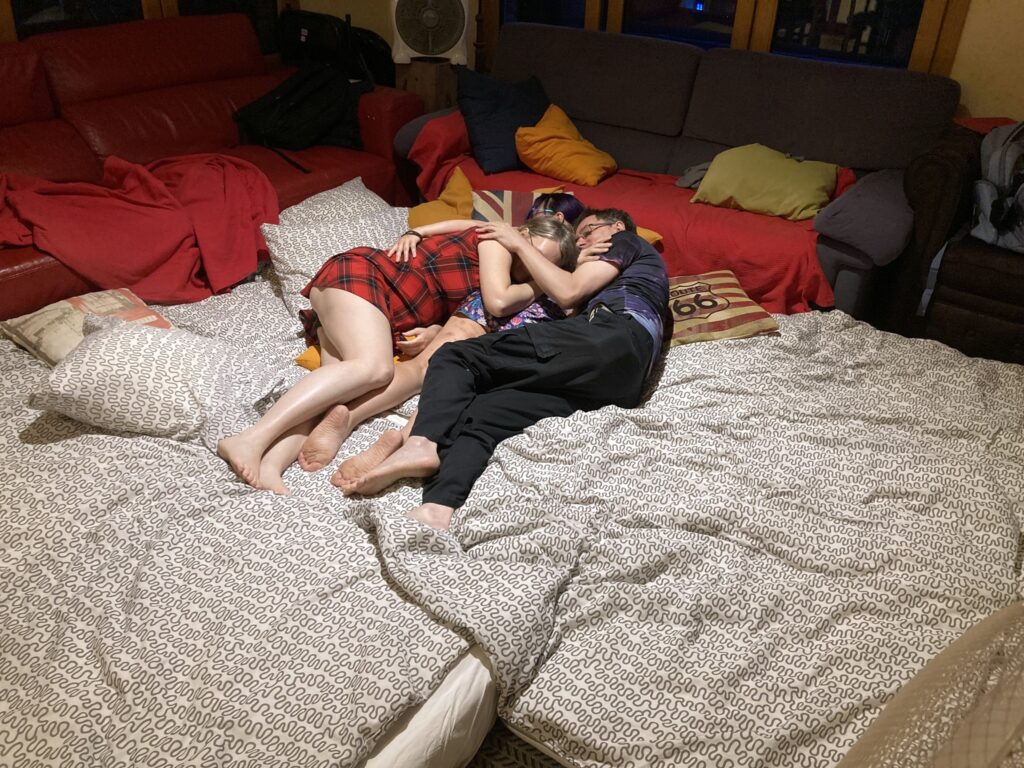I met my Talespinner online, as is often the case; when you live much of your life on the online, you frequently encounter people there. We started talking on Quora, then moved to Discord when she invited me to join a pen and paper role-playing game she runs, and eventually it came to pass we decided to meet in the real, the world of atoms and molecules.
I invited her to Barcelona with me to the extended polyamorous network get-together. And so it was that our first extended meeting also overlapped with her first meeting with my other loves and their other loves.
I am privileged to have an extended polycule made up of extraordinary people, people I am profoundly grateful to have in my life. That really came home for me when my Talespinner told me she had been a little nervous to meet my other lovers, but she found them to be incredibly warm and welcoming, and from the very beginning she found herself accepted by them. “I never had the feeling I was auditioning,” she told me, “or trying to prove myself. It’s as if I was important to you, and that was good enough for everyone else. They took it on your word.”

Me, Eunice, and my Talespinner cuddling in the orgy pit in the villa in Barcelona; photo by my wife.
It’s taken me a long time to get here, but at last I feel like I understand exactly the qualities I want in my lovers, and I can now spot those I don’t in a way I never could before. I am privileged to be surrounded by extraordinary people who love me exactly for who I am, and words cannot express what a joy that is.
I have, in the past, let people close to me who loved me, or thought they loved me—but.
But only. But only if I toned it down. But only if I changed the way I presented myself. But only if I changed my habits. But only if. Don’t do that, do this. Don’t spend your time that way. Don’t say that. You’re wonderful but you’d be even more wonderful if you’d do as I say.
And y’know, for a long time, I put up with that. I believed it was necessary. “Good relationships require compromise,” people often say, and I thought that’s what compromise looks like.
And I regretted it Every. Single. Time.
The poet e e cummings has a wonderful quote:
To be nobody-but-yourself — in a world which is doing its best, night and day, to make you everybody else — means to fight the hardest battle which any human being can fight; and never stop fighting.
It is perhaps a bit ironic that all of my current partners identify as solo poly, yet they are far warmer and more open than the partners I’ve had who’ve said they wanted closer, more “family-style” polyamory. There’s a deep truth there I’m still working to tease out. I wonder, in my more cynical moments, if kitchen-table polyamory isn’t sometimes the goal of those who want their extended network close because that way they’re easier to control; that is, if there are at least some people driven toward that kind of relationship more from fear than from desire for connection.
Something to think about.
I am absolutely grateful that I have, finally, built a social circle, a network of friends and lovers who truly love me for being me. Every single one of them, without one single exception. There is no joy in the world greater than that of being seen, really seen, by another human being who loves what they see.

I think that some people, the ones you’re referencing, use the phrase “kitchen-table poly” to be the new, updated, culturally accepted replacement for what we used to call “family oriented” poly, which itself was barely a euphemism for “commune cult”.
Because, for me, our solo poly-connected polycule IS “kitchen table”, and also what a “family” looks like.
It probably isn’t a coincidence that the “hubs” in our polycule – those who tend to have the most or the most complex connections – are the solo polys. So it’s the sopos who are basically responsible for bringing us all together.
As a family.
I’ve mentioned this in the past and I’ve been wanting to write more on the subject, but I see parallels between how sopos do poly family and how non-white people do family. Especially *immigrant* non-white people in white cultures.
At some point, the hyper-independence of the white (especially USian) culture starts to merge with the communal style of the non-white origins and we get this blending of “everyone is family” with “but everyone is also their own person”.
Which is where the term “interdependence” comes in.
And I suspect that this subset of the KTPs are not looking for interdependence because they just slapped the KTP label over what is starting to fall out of fashion – the creepy commune cult. In much the same way people slapped “nesting partner” over their primary partners, thinking that there is no difference and also seeing that NP is a more respectable label these days without understanding *why* NP is “more respectable”.
Sopos are just as likely to prefer parallel poly, and also just as likely to have the same mix of people having healthy connections and people using the terms to hide deep fears and insecurities and unhealthy attachment styles under the parallel poly umbrella.
But those of us sopos who aren’t fans of parallel poly are actually doing KTP *as it was intended*, which leads to a warm but casual acceptance of each other as family because the metamour “is important to you and that’s good enough”.
Gotta watch out for those buts!
‘I love you but’ is a bit like ‘I’m not racist but’… The important part of the sentence is always the bit *after* the but.
Personally, I just love your butt. XD